Canada’s only neighbour is the United States and too often it is neglected in comparison. But its lifting industry can hold its own against and even penetrate into US markets. Julian Champkin reports.
Say the phrase ‘North America’ and most listeners if they are not actually Canadian themselves will take you to mean the United States, with Canada added if you are determined to be all-inclusive. This is, of course, grossly unfair. Canada’s land area, at ten million km2, is bigger, if only by a fraction, than that its neighbour’s, which can only manage 9.8 million km2. Canada’s population on the other hand is 38 million, while that of the US is 332 million, which means that Canadians are outnumbered by Americans nine to one.
But Canada’s GDP, at $1.71trn, ranks tenth in the world, and any country with an economy that size cannot be considered a mere adjunct or afterthought – all the more so since the Canadian economy showed the greatest growth of any of the G7 countries in the first quarter of 2023, when GDP grew by 3.1%.
Such growth will provide demand in the lifting industry.
SMALLER GANTRY CRANES
Munck Cranes Inc. is a Canadianowned and operated company, and is an independent licensee of Norwegian company Munck Cranes AS. The Canadian entity has been manufacturing material handling equipment out of its base in Stoney Creek, Ontario, since 1983 and serves all of North America, as well as parts of South America, Mexico and the Middle East.
Overhead bridge cranes, gantry cranes, jib cranes, wire rope hoists, under hook attachments and transfer carts are all part of its product range. Its gantry cranes in particular range from the smallest portable ones to the very largest capacities.
Munck points to a not usually considered advantage of its smaller gantry cranes – their suitability for semi-permanent fabrication sites or for businesses that may be considering changing premises: “In recent years there has been a trend for smaller manufacturing business and fabrication shops to operate in leased properties such as industrial-style ‘mini mall’ units” it says. “These types of buildings typically do not ideally support the dynamic loads that would be forced upon the structure by an overhead bridge crane, making a gantry or semi-gantry crane solution an ideal fit for feasibility and costeffectiveness in material handling.
“Another great feature of the gantry or semi-gantry crane is portability, allowing business to relocate the entire crane with them to a new location when required. Gantry and semi-gantry crane systems remain a portable solution,” placing no constraints on the choice of an alternative location to move to when a business wishes to relocate.
A recent client was the Cascade Power Project, a 900MW combined cycle power generation facility being constructed in Yellowhead County, Alberta. WF Steel and Crane supplied two 140t cranes for the turbine rooms. Each was totally customdesigned to the client’s specification. They are top-running double girder cranes, each with a 22t auxiliary hoist as well as the 140t main hoist. Because of the capacity and high lifting height required the main hoists were of custom-order open winch style. All the motors are powered by variable frequency drives. WF also supplied around 385,700lbs of concrete test weights and a testing skid to carry out the load test. There was very limited space for load testing, but WF’s project manager presented a solution that was executable. Covid-induced supply-chain problems were overcome without affecting delivery times and the cranes were commissioned and tested in April last year.
Vulcan Hoist, based in Montreal, claims to be the only Canadian manufacturer of electric hoists and trolleys. Established in 1947, it nevertheless has company links back to the invention of the three-motor overhead gantry crane in 1884.
Current Vulcan products include electric chain hoists of up to 15t capacity, in one- or two-speed models. The Vulcan engineering team has developed a second safety device installed in addition to the limit switch, an additional measure intended to increase protection and safety when using the hoist. Called Safety Stop, it replaces the chain guide on single- and double-fall electric hoists and is designed to prevent collisions caused by obstacles such as the hook or knots on the chain. It consists of two springs through which the chain passes, and a balance.
75TH ANNIVERSARY
Finally, Canada has some international names in the business. One is Timberland, a large and diverse company headquartered in Ontario. Recently, it celebrated its 75th anniversary. Hoisting, winching, pulling and tensioning systems are only part of its remit but a central part – its winches, hoists, mooring systems, capstans, sheaves, A-frames and derricks – are in service in more than 50 countries as well as offshore. It has supplied hoists for spillway and water control gates for Tennessee Valley Authority (TVA), for the Brilliant dam in British Columbia, Tionesta Creek lake in Pennsylvania, and on the upper Mississippi.
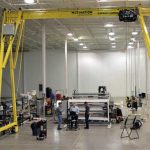

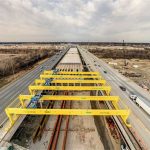

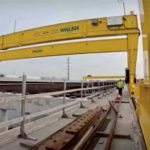

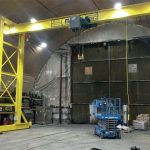
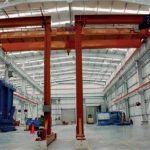
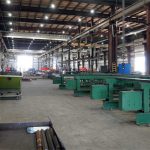
没有评论:
发表评论